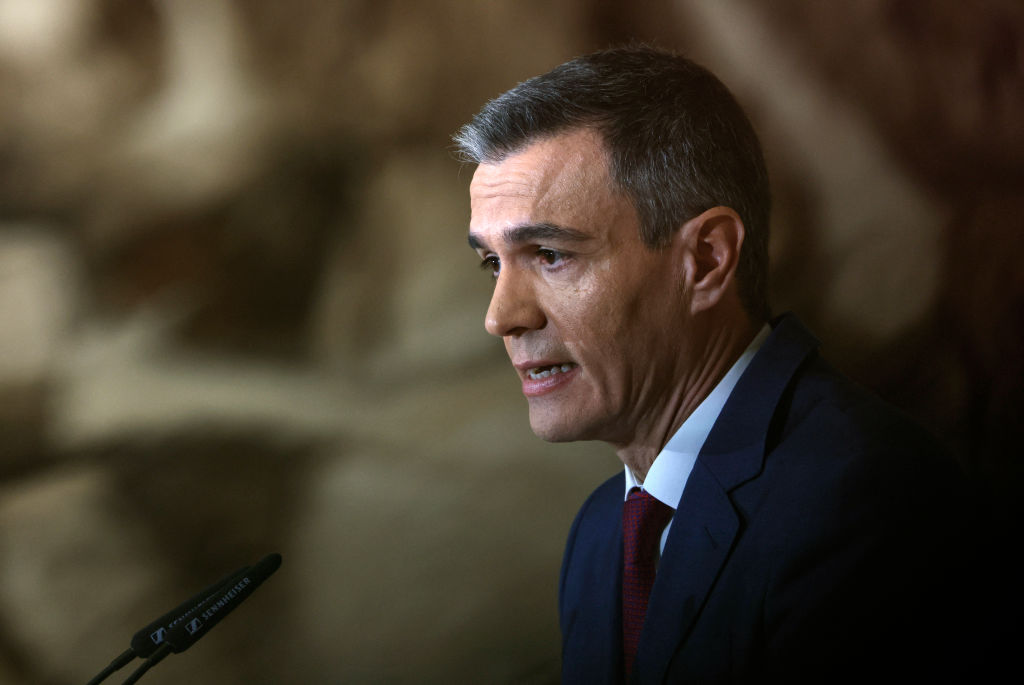Pedro Sanchez has decided to stay on as Spain’s Socialist prime minister, despite announcing last week that he was considering resigning. Sanchez suspended his official duties for a few days to make the decision, following the launch of a judicial investigation into his wife, Begoña Gomez, for corruption and influence-peddling. (Sanchez has said the allegations are ‘as scandalous in appearance as they are non-existent.’)
Accusations of corruption against political opponents and their relatives (the more, the better) has become a standard method of warfare in the Spanish political arena
The case against Gomez was brought to a judge by an anti-corruption organisation called Manos Limpias (‘Clean Hands’), which Sanchez has accused of leading a right-wing campaign designed to smear his partner and destroy his leftist coalition. But if the parties on the Spanish right, made up of the Conservative Popular party (PP) and Vox, want to do that, they have already missed several opportunities, over matters far more serious than the Gomez affair.
Sanchez required no such period of anguished reflection when Spain’s Constitutional Court ruled that the lockdown he imposed in 2020 had been illegal; nor when it emerged that an advisor to his former transport secretary was under investigation for fraud, in the so-called Koldo case; nor when he secured a third term with an amnesty for Catalan separatists that led to protests around the country. Despite being reinstalled at such a huge cost to public trust last November (70 per cent of Spaniards opposed the amnesty deal), Sanchez’s coalition is grindingly ineffective. It has already cancelled the 2024 budget, citing difficulty in securing cross-party support. The amnesty deal has made Sanchez’s life harder, not easier, because he will now have to deal with Catalan separatists’ renewed demands for a state-backed independence referendum, as well as secure their support for every piece of legislation he passes.
It was also mystifying to see Sanchez surprised at the fact that his wife had been targeted. Accusations of corruption against political opponents and their relatives (the more, the better) has become a standard method of warfare in the Spanish political arena, in which insults and personal attacks always trump reasoned discussion. It is a method that Sanchez himself has deployed, most recently against his most outspoken Conservative critic, the PP president of Madrid, Isabel Ayuso. This is, however, the first time Sanchez has been on the receiving end of such tactics.
Since Sanchez teased his critics with the prospect of his resignation last Wednesday, only to cruelly disappoint them this morning, most Spanish media outlets have focused on how upset he is at the allegations against his wife. This obscures the most important question: namely, are these allegations well-founded, and if so, is Sanchez himself in any way implicated? The flimsiness of the evidence brought to the judge by Manos Limpias doesn’t inspire confidence in the allegations. So far, the organisation has only presented to the court a selection of media reports, one of which has already been proven false. Nevertheless, Sanchez’s decision to stay on is hardly something to celebrate.
Still, many of the Socialist leader’s fans seem to be almost unconditional in their admiration of him. Despite the relative impotency of his government, the hugely unpopular deal by which it returned to power and the ongoing Koldo corruption case, thousands of pro-Sanchez demonstrators took to the streets of Madrid last week, urging him not to resign. They were presumably heartened by his announcement this morning – but why would anyone want four more years of the Sanchez Show? His supporters often respond to that by repeating what has become one of the biggest cliches in European political discourse: to prevent ‘the threat of a far-right government’ becoming reality.
This argument rests on a complete misapprehension of the facts. While it’s true that Vox has several policies that even centre-right voters find extreme, this doesn’t make them a ‘threat’ to Spanish democracy, any more than Spain’s far-left parties are. A flagrant double standard is being applied by Sanchez’s supporters, because it’s precisely for undermining democracy and the rule of law that the Spanish judiciary, EU and even some members of his own party have criticised his amnesty deal with Catalan separatists.
One demonstrator in Madrid last week said that she was frightened that a centre-right government would take over if Sanchez quit, and that ‘this will mean a step backwards for our rights and liberties’. This was said in defence of a prime minister who suspended the population’s most fundamental rights and liberties in March 2020, for a period of several weeks. Forget the supposed ‘threat’ represented by a potential PP-Vox partnership. The government that Spaniards should really be worrying about is the one led by Sanchez, who has once again refused to relinquish his tenuous grip on power.






Comments